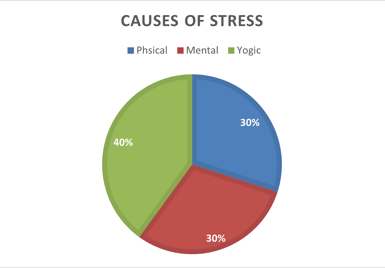Stress relation with Yoga
Explore the profound relationship between yoga and stress management. Learn practical yogic techniques to effectively cope with stress and cultivate a serene, balanced life.
BLOGS
6/18/20243 min read


In the context of yoga, stress is understood as a physical, mental, and emotional response to perceived challenges or threats. And sometimes these challenges are just in our mind and not in reality. Yoga views stress as an imbalance in the body's energy systems, which can disrupt overall health and well-being. You must have listened about chakras, and if not, we will talk about them in future just be connected to us for it. According to yoga philosophy, stress is not just an external pressure but also an internal reaction that can be managed and alleviated through various practices. Here are some key points on how yoga perceives and addresses stress:
This chart is just my view. How I look at stress and its reason. Feel free to share yours through email.
Physical Aspects
Tension in the Body: Stress often manifests as physical tension, particularly in areas such as the shoulders, neck, and back.
Energy Blockages: According to yogic principles, stress can cause blockages in the flow of prana (life energy) through the body, leading to discomfort and illness. The Prana flows through Nadis in our body.
Mental Aspects
Overactive Mind: Stress is linked to a restless or overactive mind, characterized by constant worry, anxiety, and negative thinking. Anything which is done in excess is not considered good similarly worry and anxiety in excess are simply doorways to stress.
Loss of Focus: It leads to a lack of concentration and mental clarity, making it difficult to stay present and mindful. If you are focused noting can cause stress.
Yogic Philosophical Perspective on Stress
Yoga’s understanding of stress is deeply rooted in its philosophical teachings. These teachings offer profound insights into the nature of stress and how it affects the individual.
Concept of Maya: Yoga teaches that the material world is an illusion (maya) that distracts the mind and creates stress. The pursuit of material possessions and external achievements often leads to stress because it is based on an illusionary understanding of what brings true happiness. Try to delve deep into it. Think that in this world everyone are on the same position everyone has equal amount of money, fame what do you think will people still have stress in their lives if yes feel free to email us and give us your point.
Law of Karma: The principle of karma, which states that every action has a consequence, is central to yoga philosophy. Stress can be seen as a consequence of past actions and mental patterns. Understanding karma encourages individuals to take responsibility for their actions and mental states, fostering a proactive approach to managing stress.
Purusha and Prakriti: Yoga differentiates between purusha (the eternal self) and prakriti (the material world). Stress arises when there is an over-identification with prakriti and a disconnection from purusha. Reconnecting with the true self, or purusha, is seen as a way to transcend stress. I know for someone who is very new to yoga and spirituality it is slightly difficult to understand. But keep on gaining knowledge and one day you will understand all these things.
Conclusion
Yoga addresses stress by promoting balance and harmony in the body, mind, and emotions. Through a combination of physical postures, breath control, meditation, and philosophical teachings, yoga provides practical tools to manage stress and enhance overall health and well-Attachment and Aversion: According to yogic philosophy, stress can stem from strong attachments and aversions. These attachments (raga) and aversions (dvesha) create emotional disturbances that disrupt inner peace. Recognizing and addressing these emotional drivers is essential for managing stress.


